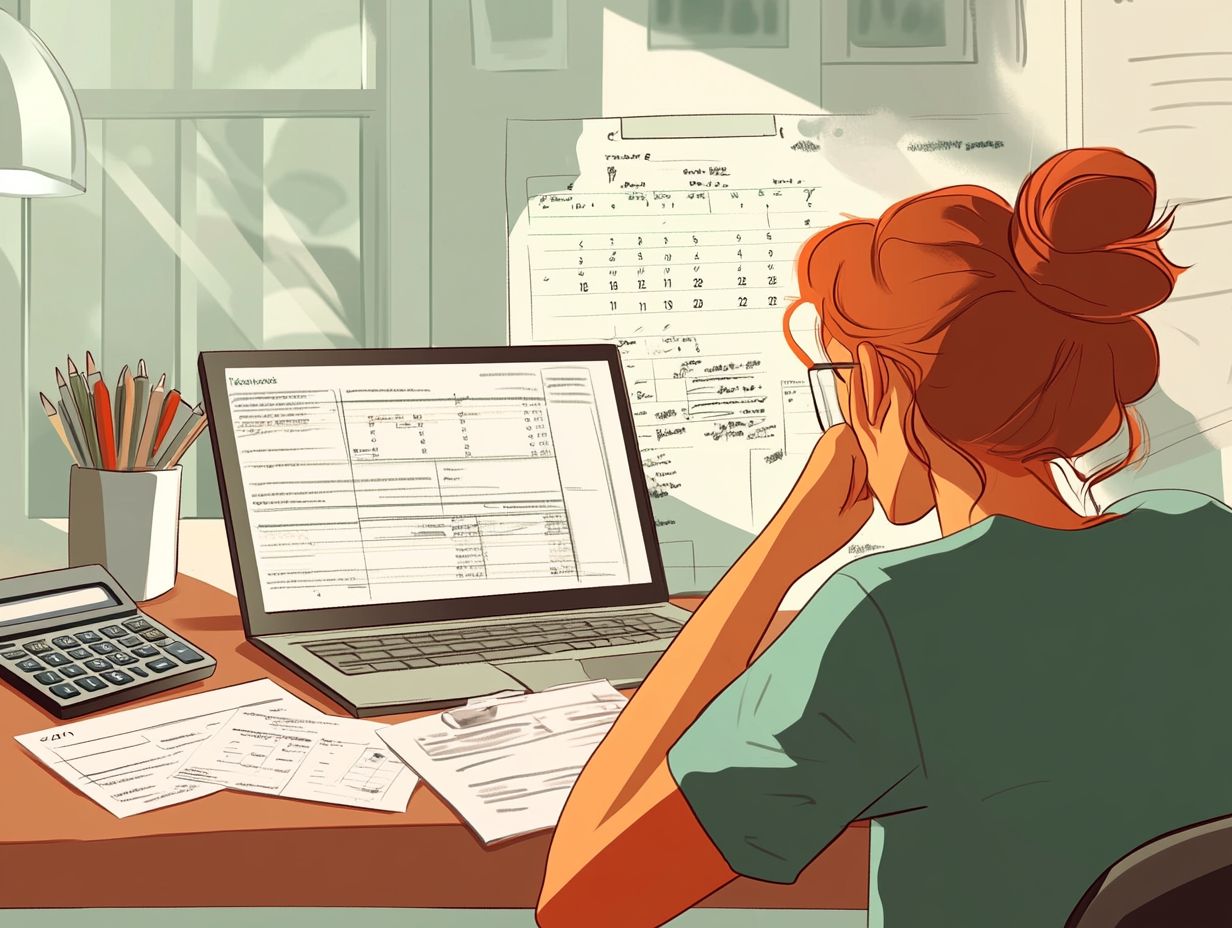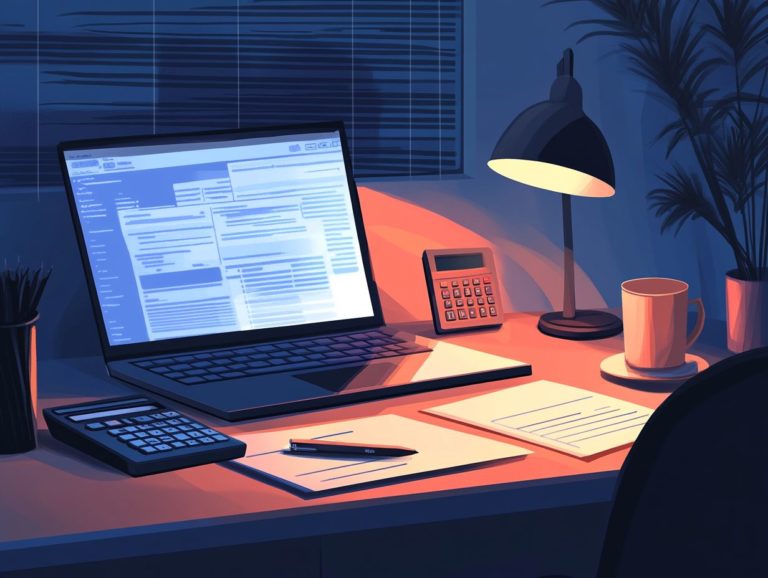Freelancer Tax Myths: What’s True?
Navigating the complexities of freelancer taxes can feel overwhelming, particularly with a myriad of misconceptions permeating the landscape.
Whether you’re just stepping into self-employment or you ve been riding the freelance wave for a while, grasping self-employment taxes is imperative for your financial well-being.
This article aims to dispel common myths, uncover valuable tax deductions, and offer crucial tips for streamlining your financial organization.
Take control of your freelance finances today! Don t wait to maximize your savings!
Contents
Key Takeaways:

- Freelancers must pay self-employment taxes, including Social Security and Medicare.
- It’s a myth that you don’t need to pay taxes if you earn less than a certain amount; this can lead to penalties.
- Keep organized records and maximize deductions to reduce your tax burden.
The Basics of Freelancer Taxes
Understanding the fundamentals of freelancer taxes is vital for ensuring compliance with IRS regulations while maximizing potential deductions for your freelance business. As a freelancer, you face different tax filing rules that diverge significantly from those of traditional employment, particularly due to self-employment taxes applied to your earnings.
It’s important for you to familiarize yourself with essential forms like the Schedule C, which plays a crucial role in reporting your income and expenses. Accurately tracking your financial records is crucial to substantiating your claims.
This knowledge equips you to navigate the tax landscape with confidence and make a positive contribution to the freelance community.
Understanding Self-Employment Taxes
Self-employment taxes include Social Security and Medicare taxes. These apply to you as an individual earning income from freelance work.
Unlike traditional employment taxes, where your employer typically covers half, you are responsible for both parts of the FICA contributions. This means your tax responsibility effectively doubles.
This means you need to calculate your net earnings carefully, as you’ll face a 15.3% self-employment tax rate on your income. It’s essential to account for these obligations when preparing your annual filings. Understanding deductibles and potential credits can significantly impact your overall tax burden.
Maintaining detailed financial records throughout the year is crucial to ensure accurate reporting when tax time rolls around.
Common Myths about Freelancer Taxes
The world of freelancer taxes is frequently clouded by myths that can mislead and perplex newcomers about their tax obligations and filing requirements. Some believe the IRS is too tough on freelancers or that self-employment taxes can be dodged entirely, but these beliefs can lead to expensive missteps.
Grasping the reality behind these misconceptions is crucial for you to confidently manage your tax responsibilities and steer clear of any potential audits. Utilizing freelancer tax tips for artists and creatives can further enhance your understanding.
Debunking Misconceptions

Many freelancers often fall into the trap of thinking that all their expenses are tax write-offs, but understanding which costs truly qualify as deductible expenses is essential for accurate income reporting.
Recognizing the difference between personal and business expenses can significantly impact the financial health of your venture. For example, costs associated with equipment, supplies, or services you use for your freelance work typically qualify as deductible expenses, potentially leading to substantial tax savings. To learn more about maximizing your deductions, check out what every freelancer should know about taxes.
When you engage in bartered transactions, it’s important to remember that the value of goods and services exchanged must be reported as income, adding a layer of complexity to the concept of net income. To avoid potential pitfalls, be aware of common freelancer tax filing mistakes to avoid. Therefore, maintaining meticulous records of your finances is crucial to ensure that no eligible write-offs slip through the cracks, ultimately resulting in a more favorable tax situation.
Tax Deductions for Freelancers
Tax deductions for freelancers are a powerful tool. They help reduce your taxable income through legitimate expenses.
The home office deduction allows you to claim part of your living expenses related to your workspace. You can also deduct costs from work-related meetings.
Using these deductions effectively can lead to significant savings on your tax returns. This makes a big difference in your financial health.
Maximizing Deductions for Your Business
To maximize deductions for your freelance business, adopt a proactive approach. Focus on spotting potential write-offs and documenting all business expenses.
Keep detailed records of receipts, invoices, and financial transactions. Consulting a financial advisor can reveal valuable insights into tax laws that benefit you.
Don t overlook less obvious expenses like software subscriptions and professional development courses. Staying organized and informed boosts your tax savings.
Tax Preparation Tips for Freelancers
Effective tax preparation requires careful organization and understanding of filing requirements. This helps you avoid last-minute stress and penalties.
Maintain well-organized financial records to ensure all expenses are accounted for. This minimizes your taxable income and allows you to implement freelancer tax strategies for the self-employed, turning tax filing into a manageable task.
Organizing Your Finances and Filing Taxes

Organizing your finances becomes easy with financial technology. It helps manage records and payments efficiently.
Intuitive apps allow you to track and categorize expenses effortlessly. Solutions like mileage tracking tools help you document business travel easily.
Integrate services that manage credit card statements to understand your spending habits. This helps maintain healthy cash flow and keeps your finances clear.
Working with an Accountant
Working with an accountant provides freelancers with valuable financial insights. This can ease the process of handling tax obligations.
Freelancers face unique challenges with income reporting and deductible expenses. An accountant can help maximize your deductions while ensuring compliance with tax regulations.
Benefits and Considerations
Partnering with an accountant offers numerous advantages. It s not just about tax preparation; it s a strategy to boost your financial performance.
By working with a financial expert, you gain insights into maximizing tax write-offs. This means keeping more of your hard-earned income.
An accountant can streamline operations, making it easier to track expenses and revenues. This boosts your overall business efficiency.
The personalized advice you receive helps when dealing with complicated tax rules. Accountants pinpoint growth opportunities and ensure you meet industry standards, crafting tailored strategies for the unique financial landscapes freelancers encounter.
Frequently Asked Questions
What is the truth about taxes for freelancers?

The truth about taxes for freelancers is that it can be complicated and varies depending on your specific situation. While there are some common myths surrounding freelancer taxes, it’s important to understand the facts to avoid any potential issues with the IRS.
Do freelancers have to pay taxes?
Yes, freelancers are required to pay taxes just like any other self-employed individual. This includes federal income tax, self-employment tax, and possibly state and local taxes depending on your location. In the UK, for instance, freelancers may also need to consider National Insurance contributions along with corporation tax.
Are freelancers exempt from paying certain taxes?
Freelancers are not exempt from paying taxes, but they may be eligible for certain deductions and credits that can lower their tax liability. Common tax write-offs include work expenses and personal expenses related to their freelance environment. Don t miss out on potential savings talk to a tax pro!
Do freelancers need to file taxes quarterly?
In most cases, yes. Freelancers are typically required to make quarterly estimated tax payments to the IRS. This helps prevent a large tax bill at the end of the year and ensures you are paying your taxes throughout the year. For those using platforms like QuickBooks or YunoJuno to manage income, tracking gross receipts and client payments can simplify this process.
Can freelancers deduct all of their business expenses?
No, freelancers cannot deduct all of their business expenses. The IRS has specific rules and limitations on what can be deducted as a business expense.
It’s crucial to keep accurate records, including receipts for cash payments. Consult a tax professional to find out which expenses are deductible, like income earned through trade.
What happens if a freelancer doesn’t pay their taxes?
If a freelancer fails to pay their taxes, they may face penalties and interest from the IRS or HMRC (Her Majesty’s Revenue and Customs) in the UK.
Stay on top of your tax payments and file accurate returns to avoid potential issues. Don’t let tax issues catch you off guard!






